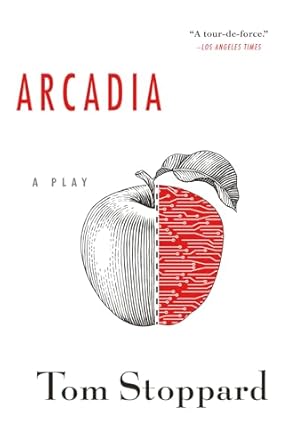Discover the brilliance of Tom Stoppard’s “Arcadia,” a thought-provoking play that seamlessly intertwines the past and present in a magnificent Derbyshire estate. Set in 1809, the story revolves around the insightful Lady Thomasina Coverly and her enigmatic tutor, Septimus Hodge, as they navigate the complexities of love, knowledge, and the nature of truth. With sharp wit and intellectual depth, Stoppard challenges our understanding of time and the Classical versus Romantic ideals, all while revealing the humorous and often chaotic influence of desire.
Whether you’re a theater enthusiast or new to Stoppard’s work, “Arcadia” offers a captivating exploration of human connections across centuries. This timeless masterpiece not only entertains but also invites readers to reflect on the intricate relationships that shape our lives. Don’t miss the chance to delve into this rich narrative that has made “Arcadia” a staple in modern literature and drama.
Arcadia
Why This Book Stands Out?
- Innovative Structure: The play masterfully weaves between the past and present, creating a dynamic narrative that challenges conventional storytelling.
- Intellectual Depth: Stoppard delves into profound themes such as truth, time, and the dichotomy between Classical and Romantic ideals, prompting readers to engage with complex philosophical questions.
- Rich Characterization: The characters, from the inquisitive Thomasina to the insightful Hannah, are crafted with depth, each representing different facets of intellect and emotion.
- Historical Intrigue: The backdrop of Lord Byron’s rumored scandal adds an element of mystery and allure, enriching the narrative with historical context.
- Wit and Humor: Stoppard’s signature wit permeates the dialogue, making the exploration of serious themes both engaging and entertaining.
- Stunning Imagery: Vivid descriptions of the Derbyshire landscape and the transition from Classical to Gothic styles enhance the play’s visual and thematic richness.
Personal Experience
Reading Tom Stoppard’s “Arcadia” can be an enlightening journey that resonates on multiple levels. The interplay between past and present, alongside the exploration of timeless themes such as love, knowledge, and the pursuit of truth, invites readers to reflect on their own experiences and insights. Here are some relatable aspects that might strike a chord:
- Connection to Time: The dual timeline of the play serves as a reminder of how our past experiences shape our present selves. Readers may find themselves contemplating their own life events and the lessons learned over time.
- Exploration of Love: The various romantic entanglements depicted in the play highlight the complexities of relationships. Many readers can relate to the confusion and excitement that love can bring, often likening it to the “disruptive influence of sex” that Stoppard portrays.
- Pursuit of Knowledge: The intellectual debates between characters resonate with anyone who has ever sought understanding or grappled with philosophical questions. Readers may reflect on their own quests for knowledge and the challenges they face along the way.
- Interplay of Nature and Human Emotion: The beautiful setting of Sidley Park and its evolving landscape symbolize the transition of human emotions. Readers may connect with the idea of finding peace and clarity in nature, paralleling their own experiences of seeking solace in the outdoors.
- Humor in Life’s Absurdities: Stoppard’s wit and humor shine through the dialogue, prompting readers to find humor in their own life’s complexities and absurdities, reminding us that laughter can often be a coping mechanism.
Ultimately, “Arcadia” invites readers to engage with its themes on a personal level, encouraging a deeper understanding of their own lives and the world around them.
Who Should Read This Book?
Tom Stoppard’s “Arcadia” is a compelling read for a diverse range of audiences. Its intricate themes and rich character development offer something valuable to various groups:
- Literature Enthusiasts: Those who appreciate nuanced dialogue and layered storytelling will find Stoppard’s writing particularly engaging.
- Students of Theatre: Drama students and aspiring playwrights will benefit from analyzing Stoppard’s innovative structure and use of time as a narrative device.
- Fans of Historical Fiction: Readers interested in the interplay between history and personal lives will enjoy the dual timelines and historical context presented in the play.
- Philosophical Thinkers: Individuals drawn to existential questions about truth, time, and human relationships will find the play’s themes thought-provoking.
- Educators: Teachers looking for thought-provoking material for discussion in literature or drama classes will find “Arcadia” an excellent choice for stimulating conversation.
Arcadia
Key Takeaways
Tom Stoppard’s “Arcadia” offers readers a rich exploration of various themes and insights, including:
- The Nature of Truth and Time: The play delves into how truth can be perceived differently across time periods and contexts.
- Classical vs. Romantic Ideals: Stoppard contrasts the rationality of the Classical era with the emotional depth of the Romantic period, prompting reflection on personal and societal values.
- Impact of Sexuality: The play examines how romantic and sexual relationships influence human behavior and societal dynamics, highlighting the complexity of attraction.
- Historical Context: Through its dual timelines, “Arcadia” illustrates how history can shape present realities, encouraging readers to consider the legacy of the past.
- Human Curiosity: The character of Bernard Nightingale embodies the quest for knowledge and the desire to uncover hidden truths, emphasizing the importance of inquiry and exploration.
- Interconnectedness of Ideas: The play suggests that various fields of knowledge—science, literature, and history—are interconnected, inviting a multidisciplinary approach to understanding life.
Final Thoughts
Tom Stoppard’s “Arcadia” is a brilliant exploration of the interplay between past and present, truth and time, and the complexities of human emotions. Set against the backdrop of a grand English estate, this play weaves together themes of love, knowledge, and the pursuit of meaning, making it a timeless classic that resonates with readers across generations.
Here are some key reasons why “Arcadia” is a valuable addition to your bookshelf:
- Intriguing narrative that shifts between two centuries, offering a rich tapestry of historical context.
- Profound insights into human nature, showcasing the interplay of intellect and emotion.
- Witty dialogue and sharp humor that entertain while prompting deep reflection.
- Exploration of philosophical themes that remain relevant in today’s world.
For anyone who appreciates masterful storytelling and thought-provoking theater, “Arcadia” is a must-read. Don’t miss the chance to delve into this captivating work. Purchase your copy now!





